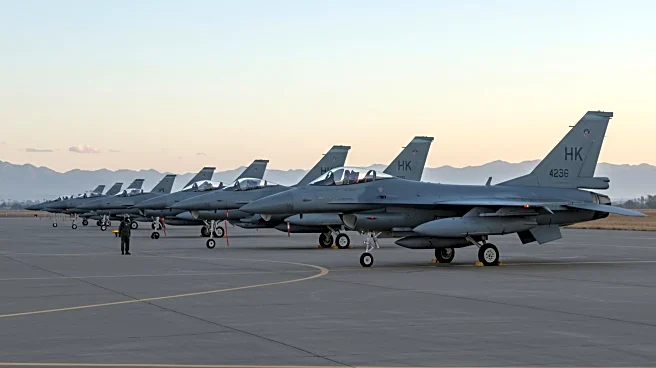What's Happening?
South Korea is experiencing a significant reduction in its military forces due to a declining birth rate and a shrinking pool of young men eligible for service. A recent report from the Defense Ministry highlights a 20% decrease in troop numbers over the past six years, with the military now comprising 450,000 personnel, down from 563,000 in 2019. This decline is attributed to complex factors including population decrease and fewer men opting for military careers due to challenging conditions. The report warns of potential difficulties in maintaining elite manpower and operating equipment if the trend continues. This development comes at a time when North Korea is ramping up its military presence, raising concerns about regional security dynamics.
Why It's Important?
The reduction in South Korea's military forces poses significant implications for national security and regional stability. As a key ally of the United States, South Korea's ability to maintain a robust defense force is crucial, especially given the mutual defense treaty with Washington. The decline in troop numbers could impact South Korea's readiness to respond to threats from North Korea, which has been increasing its military activities and rhetoric. Additionally, the shrinking military workforce may necessitate a shift towards technological advancements to compensate for the reduced manpower, potentially influencing defense strategies and military spending.
What's Next?
South Korea may need to explore alternative solutions to address the military manpower shortage. This could include increasing the recruitment of women, enhancing military welfare, and investing in advanced technologies such as drones and AI-assisted systems to bolster defense capabilities. The government might also consider cultural shifts to improve perceptions of military service and attract more volunteers. As the population continues to decline, establishing an optimized manpower structure will be essential to maintain military effectiveness in the coming decades.
Beyond the Headlines
The shrinking military numbers in South Korea highlight broader demographic challenges facing the nation, including an aging population and low birth rates. These issues could have long-term impacts on various sectors, including the economy and social services. Additionally, the situation underscores the importance of addressing cultural attitudes towards military service and improving conditions to attract and retain personnel. The evolving security landscape may also prompt South Korea to strengthen alliances and enhance cooperation with international partners to ensure regional stability.









